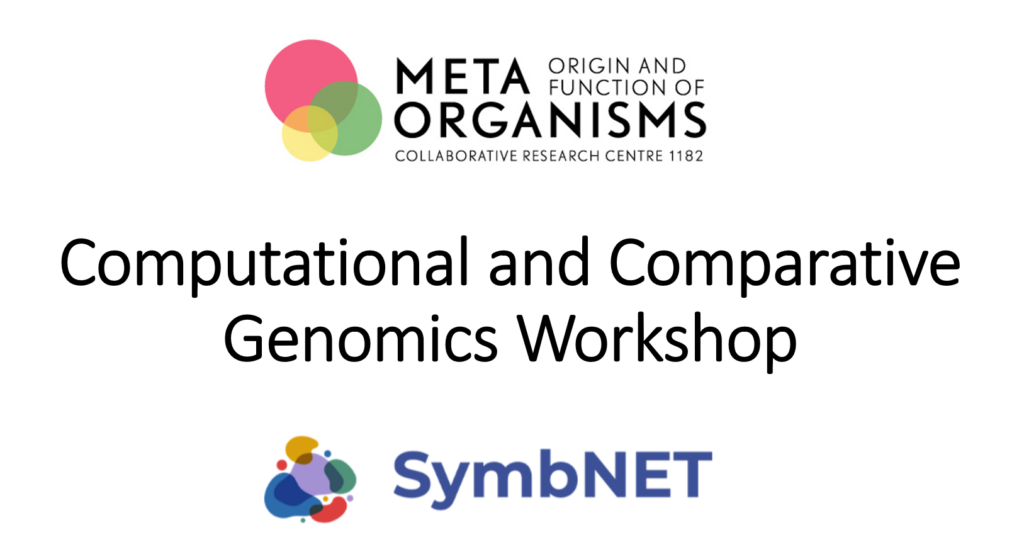SymbNET Online Seminar Series – Maria Zimmermann-Kogadeeva (EMBL) & Waldan Kwong (FCG-IGC)
Dear all,
On 17th February (Thursday), we will have the next session of the SymbNET Seminar Series:
15:00 WET / 16:00 CET
Maria Zimmermann-Kogadeeva
European Molecular Biology Laboratory (EMBL), Heidelberg
Multi-omics-based Modelling of Microbial Ecosystems Lab
Quantifying gut microbiota contribution to the host metabolism of medical drugs and dietary compounds.
The gut microbiota plays an essential role in host health, helping to catabolize indigestible nutrients and engaging in host metabolism. However, quantifying microbial contribution to the host metabolism remains challenging due to the complexity of host-microbiota relationships and the fact that most metabolites are indistinguishable between organisms. To disentangle diet, host and microbiome contributions to the host metabolism of medical drugs and dietary compounds, we combine controlled gnotobiotic mouse experiments and multiomics data integration with mathematical modelling and metabolic network analysis. We colonize germ-free mice with single bacterial species or synthetic communities, and compare drug metabolism or diet response in the colonized mice against germ-free mice. We collect large-scale metabolomic data across mouse tissues, and develop dynamic and steady-state metabolic models to quantify microbiota contribution to metabolite profiles. To identify bacterial players and their pathways responsible for the microbiota-associated metabolism, we collect metagenomic and metatranscriptomic data and integrate them into genome-scale metabolic networks. This combination of experimental and computational approaches unravels mechanistic links between drugs, diet, microbiota and the host, and provides insights into how compositional shifts and metabolic adaptation of single bacteria might affect community metabolism.
15:30 WET / 16:30 CET
Waldan Kwong
Instituto Gulbenkian de Ciência (IGC-FCG)
Microbial Genomics and Symbiosis Group
Bees & Corals: Microbial insights from diverse model systems
Microorganisms have developed numerous ways of interacting with each other and with eukaryotic hosts, but most of these evolutionary innovations remain unknown and uncharacterized. Here, I present work in two systems – social bees and corals – where the combined use of genomic sequencing and environmental surveys have helped unravel the identity and function of their respective microbial communities. I show that, even from these well-studied animal hosts, novel insights into microbial cell biology, evolution, and symbiosis can be gleaned. As technological capabilities in sequencing and cultivation improve, the study of diverse model systems will become more accessible and rewarding, by opening up a previously untapped world of microbial diversity.
These will be monthly online seminars on host-microbe symbiosis, genomics, and metabolomics, with two talks from SymbNET researchers.
Slots of 30 minutes to talk with the speakers will be available after the seminars. Priority will be given to students and Postdocs from SymbNET members Institutions. If you are interested, please contact Mariana Simões at symbnet@igc.gulbenkian.pt.
These seminars are open and free of charge. You can find more information at https://igc.events.idloom.com/symbnet_seminars.
If you already registered for SymbNET activities before, you will receive a link to this seminar closer to the date. If not, please register at https://igc.events.idloom.com/symbnet_seminars.
We are looking forward to your participation.
SymbNET – Genomics and Metabolomics in a Host-Microbe Symbiosis Network
This project has received funding from the European Union’s Horizon 2020 research and innovation programme under grant agreement No 952537

Who
When
February 17th, 2022
16:00



